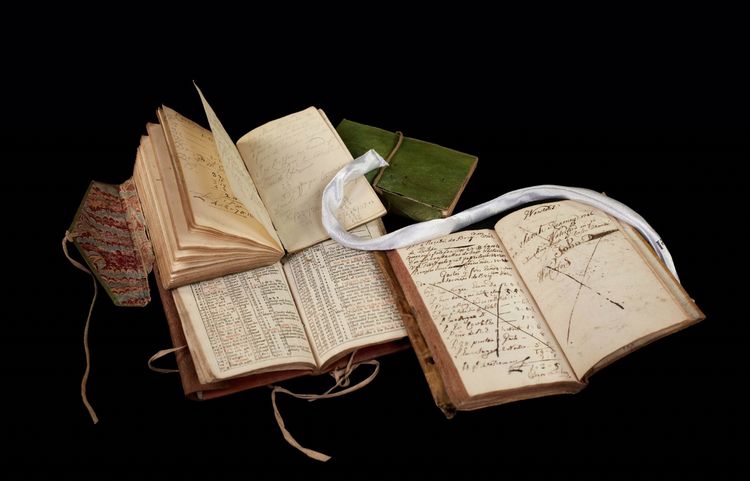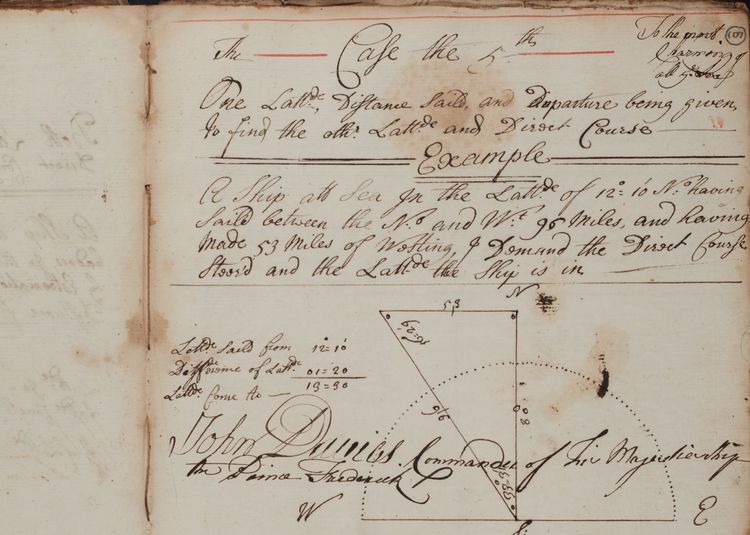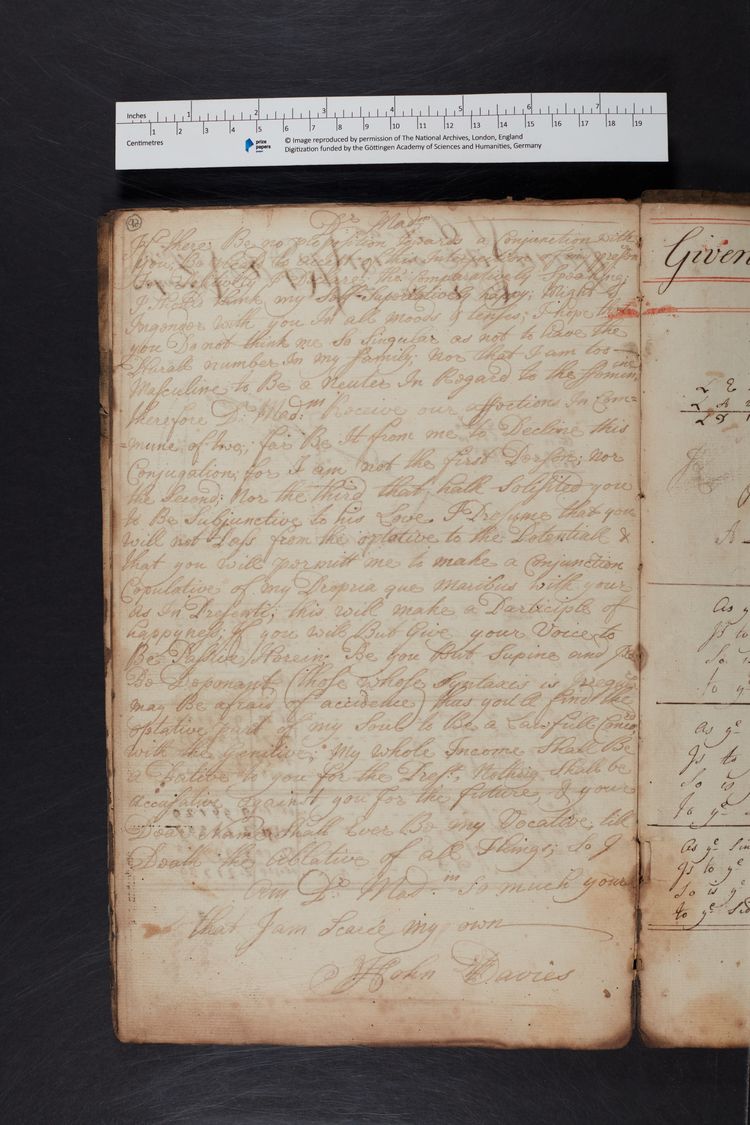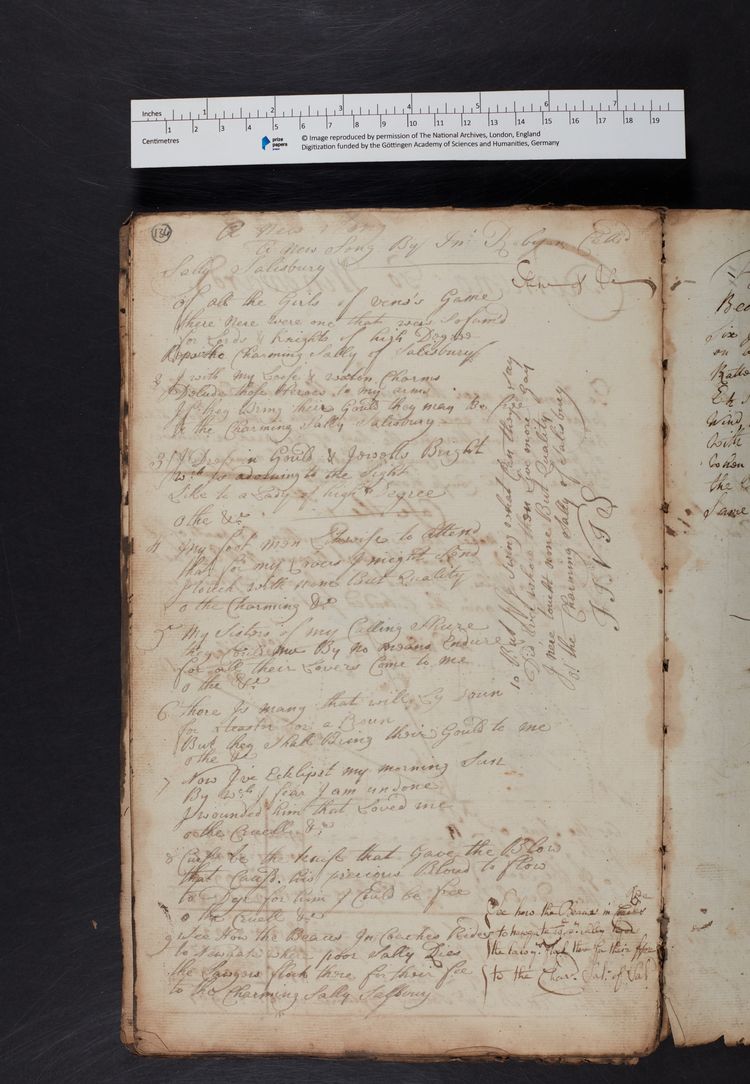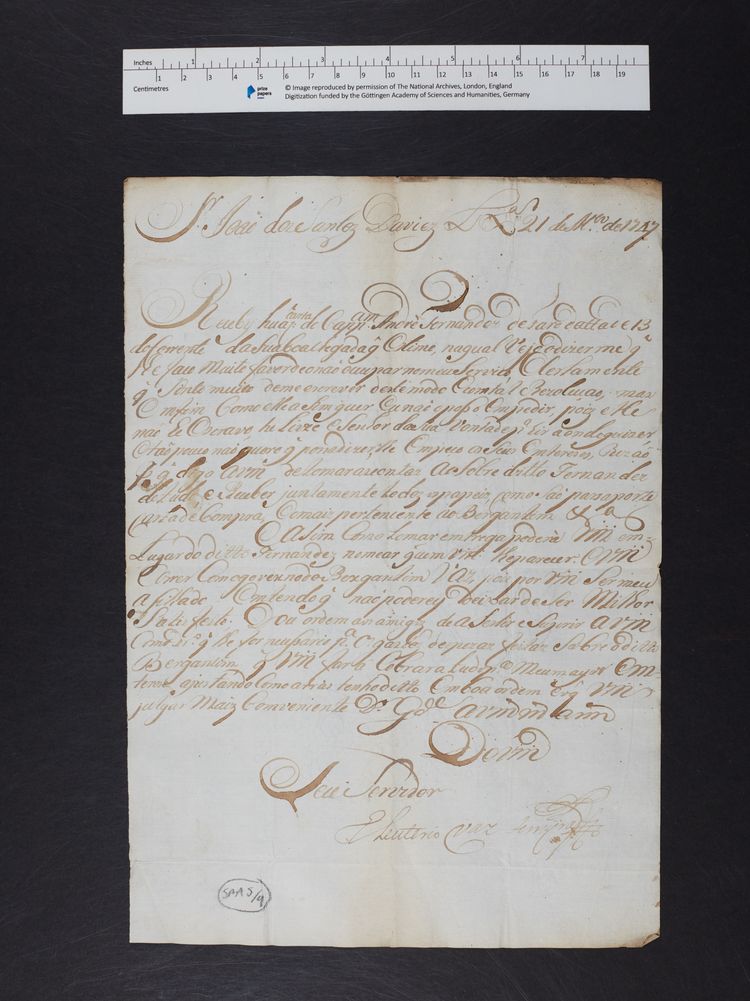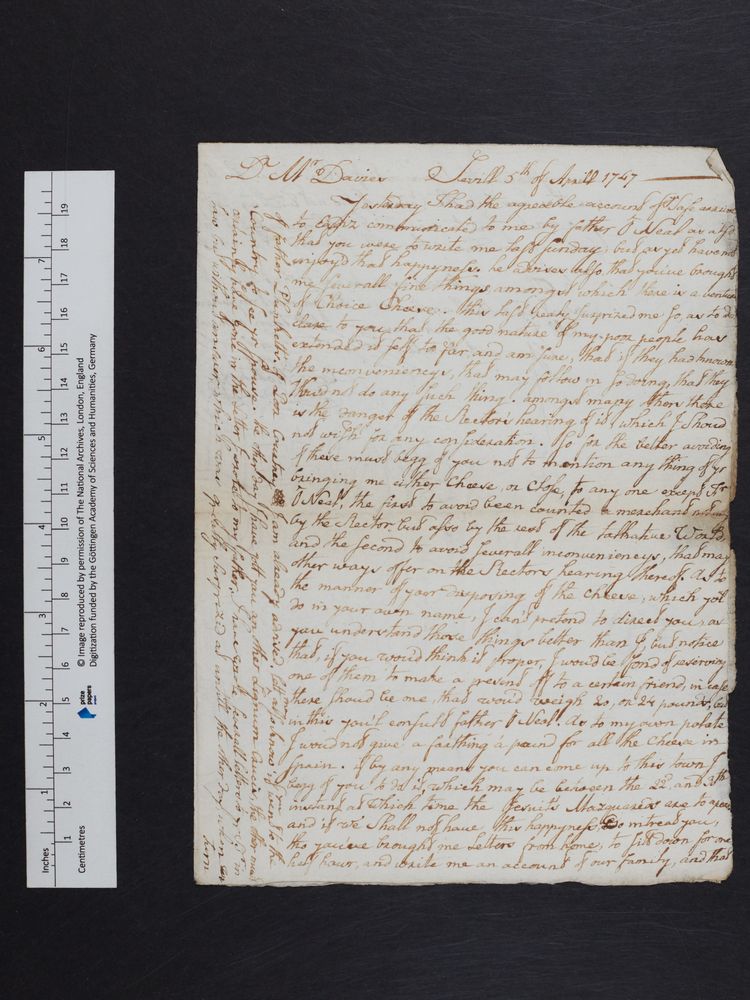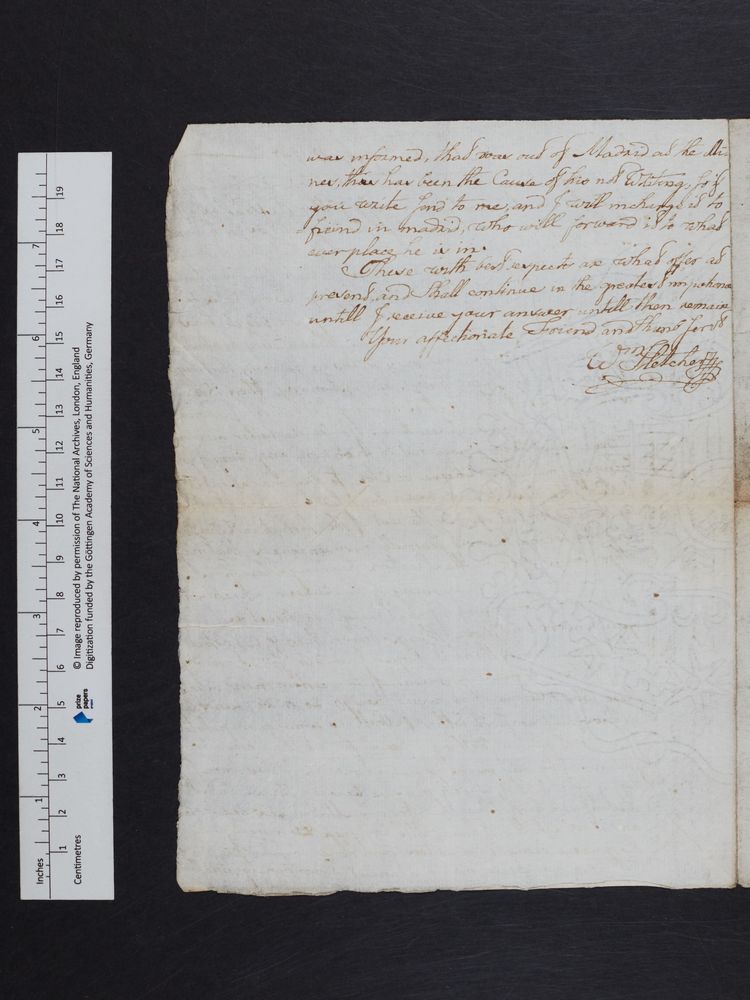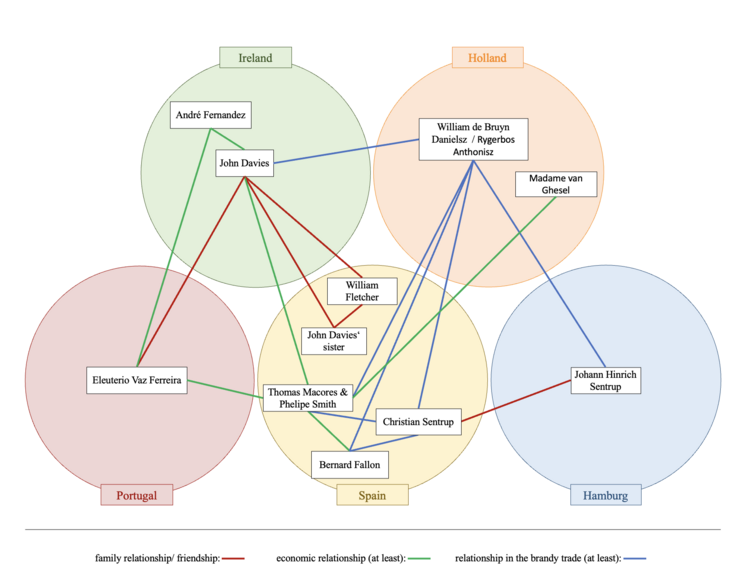O Vaz de Lisboa
Discover HCA 32/157/22 in TNA Discovery
Browse the documents in the Prize Papers Portal
John Davies‘ Archive:
The Ship's Papers from on board the O Vaz de Lisboa contain valuable documents that provide an insight into the daily life and zeitgeist of the past. The archive of John Davies is particularly exciting.
Download transcription as PDF file
“1) Of all the girls of [venus’] game / there [never] were one that was so fam’d / for lords & knights of high degree / repair the charming Sally of Salisbury […] / 3) I dress in gould & jewells bright / which is adorning to the sight / like to a lady of high degree / o, the [charming Sally of Salisbury] […] / 9) See how the beaus in coaches rides / to Newgate where poor Sally dies / the lawyers flock there for their fee / to the charming Sally Salisbury […]”
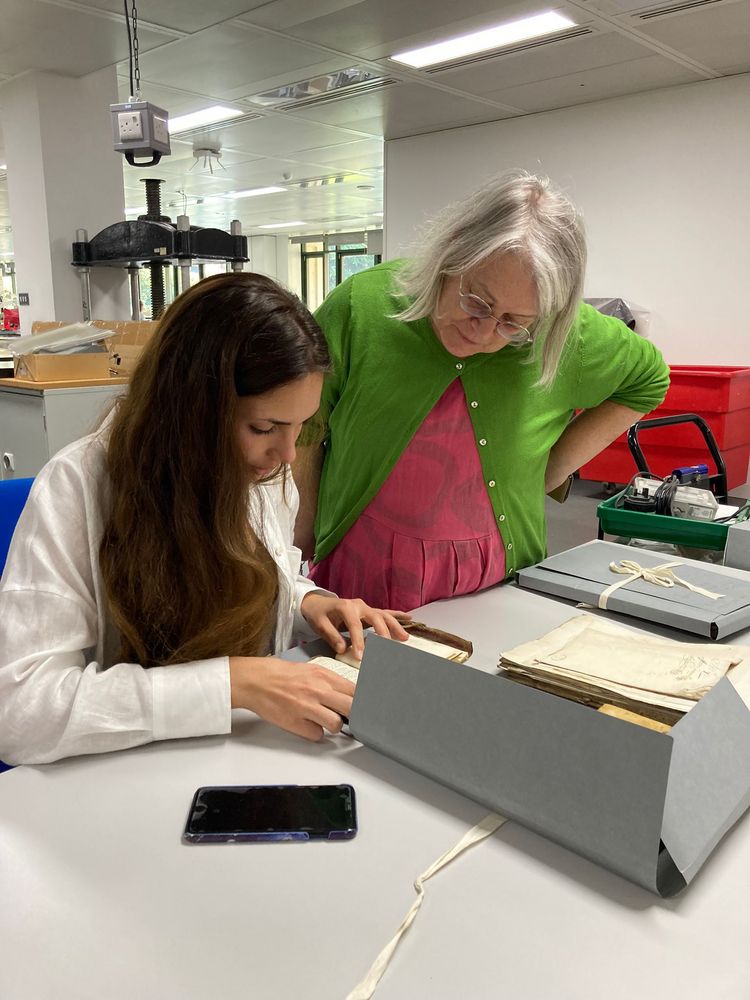
O Vaz de Lisboa
Carrying approximately 187 barrels of brandy, the Portuguese-flagged O Vaz de Lisboa set sail from the port of Sanlúcar de Barrameda (Spain) in the early morning of 21 April 1748. The planned route was to sail along the Iberian west coast, cut across the Bay of Biskaya, and then head towards the destination port in Amsterdam via the English Channel. However, given the ongoing War of the Austrian Succession (1740-1748), the planned voyage held risks: British privateers on one side and allied French and Spanish forces on the other cruised the seas in search of enemy merchant ships. A short prayer in the ship's journal shows that the nine-man crew on the O Vaz de Lisboa was aware of this risk: "God send us a good passage & preserve us from our enemies. Amen." Unfortunately, this wish was destined to remain unfulfilled.
After the O Vaz de Lisboa had narrowly escaped capture three times by both Spanish and British privateers, it was ultimately the British 'Channel'-privateer Cambridge that ended her voyage prematurely on 17 May 1748. Instead of reaching Amsterdam, the brigantine was escorted to the port of Dover, where she and some of her crewmembers would remain for the next few months while the legality of the capture was examined by the High Court of Admiralty in London. More than a half year after capture, the office-holding Admiralty Judge Sir Henry Penrice decided on 31 December 1748 to condemn the ship and its laden brandy as lawful prizes.
What distinguishes O Vaz de Lisboa from other ships?
A total of 3,434 ships were seized by the British during the War of the Austrian Succession, with Portuguese ships being a rarity among them. The reason for this may be found in the close Anglo-Portuguese friendship that had developed since the mid-17th century. A treaty was signed in Westminster in 1654, which laid the foundations for Anglo-Portuguese relations until 1810 (Wiecker 2012, pp. 48-49; Newitt 2019). In addition to granting religious liberty to English and later British traders in Portugal and beneficial customs conditions on both sides (extended in in the better-known Methuen Treaty of 1703), reciprocal freedom of trade was granted. This meant that the ships from both nations were allowed to dock at any trading port with any goods without obstruction from the other (Wiecker 2012, p. 47). Although the British did not welcome the involvement of neutral Portugal in enemy trade during the War of the Austrian Succession, such actions were not prohibited by their diplomatic relations (Newitt 2019). Against this backdrop, the capture of the O Vaz de Lisboa, and particularly the decision of the High Court of Admiralty, seems extraordinary, prompting the following question:
What was the reasoning behind the High Court of Admiralty's judgement to condemn the ship O Vaz de Lisboa and the brandy as lawful prizes?
The search for an answer resembles a detective's hunt for clues within the Ship's and Court Papers of this collection. Some of the key documents are presented and contextualised in this case study.
Examinations (21 May 1748)
Based on the Standing Interrogatories
The reason for the court's decision is closely linked to the question of whether the O Vaz de Lisboa was actually a Portuguese ship. In this context, it is important to note the country-specific flag laws. The following conditions had to be fulfilled in order to be allowed to sail under the Portuguese flag:
A Portuguese ship had to be 1) of Portuguese construction, 2) of foreign construction acquired against payment of tonnage tax, or 3) legally captured and condemned in wartime. Furthermore, the ship had to be wholly owned by one or more Portuguese subjects or by a foreigner or foreigners naturalised in Portugal. Additionally, the captain and at least two-thirds of the ship's crew had to be Portuguese subjects (Testa 1882, pp. 59-60).
Important indications as to whether the conditions were met in the case of the O Vaz de Lisboa can be found in the transcripts relating to the interrogation of the crew members Joze Caravalho (‘official’ captain), John Davies (‘official’ first mate), Joze Deas Carvalho, and the ship’s boy John Davies on 21 May 1748.
The documents show that the brigantine previously sailed as the Enterprize under the British flag before being captured by the French in 1744, condemned as a lawful prize, and then sold in Bayonne. Eleuterio Vaz Ferreira, a Portuguese merchant residing in Lisbon, is named as lawful and sole purchaser and shipowner, which seems to fulfil the conditions for origin and ownership. The information on the ‘nationality’ of the crew members, given in the interrogation transcripts, is not consistent, but it appears most likely that six of the nine crew members were Portuguese, including the ‘official’ captain Joze Caravalho. Two of the remaining men were said to be Irish and one - the ‘official’ mate John Davies – was Welsh. This suggests that the two-thirds ratio and the prescribed ‘nationality’ of the captain were likely maintained.However, a statement made by Joze Deas Carvalho is of great relevance:
“[…] [This] Deponent saith he knoweth not wether Jose Caravalho or John Davies was the master of the ship or vessel […], because the title of captain is generally given to them both. And whilst the ship was loading at Saint Lucar, the said Jose Caravalho worked and acted in the loading her as the mate of her, and the said John Davies lived all the while on shoar and sent his orders on board as master of her, and both of them paid him money there on account of his wages, and when she came to sea, the said John Davies was called mate, and the said Jose Caravalho was called master of her, and the said John Davies navigated her and carryed the command on board her and sometimes watched, and the said Jose Caravalho did not watch nor do any thing onboard her […].” (CP 4)
This statement indicates that John Davies acted as captain of the small merchant ship both on land and at sea, which leads to the assumption that he held this rank unofficially. A detailed examination of the Ship’s Papers confirms this. For example, certain wage agreements clearly show the ‘true hierarchy’ aboard the ship. While John Davies' monthly salary was 19,200 Réis, Joze Caravalho only received 10,500 Réis. The reason for the deception is obvious: as John Davies was not Portuguese, Joze Caravalho stepped into this position in a representative capacity. It is also apparent from the interrogation transcripts and confirmed by the Ship's Papers that Joze Caravalho was not the first man to hold this position aboard the O Vaz de Lisboa for such reasons. Previously, it was the Portuguese André Fernandez, a resident of Dublin, who officially held the position of captain due to his ‘nationality’.
The Second Examination of Joze Caravalho (6 August 1748)
Based on the Standing Interrogatories
Almost two and a half months had passed since the interrogations of the crew members on 21 May 1748, yet the High Court of Admiralty still not had reached a verdict. At present, Joze Caravalho seemed to have little hope a decision would be made soon, leaving him grappling with financial challenges. He had already tried to obtain financial assistance for his stay in Dover from the shipowner of the O Vaz de Lisboa and facing refusal, Joze Caravalho made a self-serving decision. On the evening of 5 August 1748, he approached James Goldfrap, who was present in the King's Head Tavern in Dover as an agent of the privateer Cambridge in a deputy capacity for her owners, with an offer: he and some of his crew would undergo another interrogation and testify in favour of the privateers in return for ten guineas for himself and seven or eight pounds for his crew. As reason for the offer, Joze Caravalho stated, ”[…] that it was to no purpose for him to stay there and be starved for that the agent for the owners of the ship and cargo would not supply him with necessary money to defray his and his crews expences.” (CP 14) Trusting the seriousness of the intention, James Goldfrap agreed to the terms and promised to pay out the money as soon as the “truth had been told.” The very next day, on 6 August 1748, Joze Caravalho appeared accompanied by the two other crew members Joseph Mauriçio and Johan Francisco for the second interrogation.
The answers to the questions regarding the capture, crew and route of the ship are consistent to those given on 21 May 1748. The major and significant difference lies in the information about the ship and cargo owners. Instead of Eleuterio Vaz Ferreira, all three witnesses now named Phelipe Smith and Thomas Macores as owners of the O Vaz de Lisboa and the brandy. The transcripts provide the following information about the two men:
“[…] [They] are both natives of Ireland, naturalized in Spaine, and live with their wives and familys the said Philipe Smith at Cadiz and the said Thomas Macores at Seville in Spain and are subjects to the King of Spain”. (CP 12) Joze Caravalho added as a supporting argument that he had been appointed captain by Phelipe Smith and that the latter would pay the crew's wages. Furthermore, the document states about the brandy: ”And the said Phelipe Smith and Thomas Macores were the owners thereof, as he believes, because the said Thomas Macores and Bernard Fallon, who is the correspondent of the said Phelipe Smith and Thomas Macores, went to Seville in Spain and bought the same.” (CP12)
According to this information, both the ship and the goods would have been considered as having an enemy status owing to Spanish ownership, indicating a lawful capture. However, the credibility of this statement was greatly diminished by the fact that Joze Caravalho fled Dover the day after his second interrogation.
John Davies Statement on Joze Caravalho's Escape (8 November 1748)
On 8 November 1748, John Davies was questioned about the second interrogation of Joze Caravalho. The associated transcript states:
“[…] and this Deponent also says that he has been credibly informed and verily believes that the said Caravalho was examined a second time before the Commission at Dover at the request of the agent for the privateer and that he was induced thereto for gain or reward for. He has been credibly informed that the said Caravalho received ten Guineas by the order of the agent for the Privateer and this Deponent also knows that a Debt of about Seven or Eight Pounds due to Sarah Fox Widow of Dover for the subsistence and Lodging of the crew of the O Vaz de Lisbon aforesaid was discharged by the order of the said agent for the Privateer.” (CP15)
With this statement, John Davies further undermined the credibility of Joze Caravalho's second interrogation, during which he officially provided the court with details of bribery. He also commented on Joze Caravalho's character, ”[…] that the said Caravalho, whilst he was at Dover, led a very loose, expensive and extravagant life.” (CP15) In doing so, he highlighted Joze Caravalho's selfish financial interest, which could have led him to provide false information against his employers. John Davies himself remained loyal during the entire court process. He consistently testified that Eleuterio Vaz Ferreira was the sole owner of O Vaz de Lisboa and that the brandy trade was legal.
Two Letters to John Davies
The transcripts of the interrogations of 21 May 1748 show that, although John Davies was born in Wales, he had been residing in Dublin with his wife and children since at least 1746. Two letters give further insight into his family relationships.
On 21 March 1747, Eleuterio Vaz Ferreira wrote a Portuguese letter in which he expressed his confidence in John Davies, among other things. He stated: ”[…] pois por vossemecê ser meu afilhado emtendo que não poderey deixar de ser milhor satisfeito [...].” (”because you are my godson, I don't think I could have been happier […].“) (SPA5/9) Other sources show that John Davies himself could write Portuguese fluently and therefore probably also speak it. This proficiency in Portuguese suggests that he had strong ties to Portugal, which can be recognized in connection with the godfather relationship with Eleuterio Vaz Ferreira. Moreover, it is likely that this relationship is the reason why John Davies found his way onboard the O Vaz de Lisboa.
The second letter was written by William Fletcher on 5 April 1747. In it, he asks John Davies to visit him in Seville: ”If by any means you can come up to this town, I beg of you to do it […]. And if we shall not have the happiness, do intreat you, tho’ you’ve brought me letters from home, to sitt down for one half hour and write me an account of our family […]. (SP A5/11). In addition to the strong emotional value of letters as a connecting medium to home, it is clear from the lines that William Fletcher and John Davies not only had a close friendly relationship but were also both part of the same family circle. A fraternal relationship can be ruled out due to the different surnames and the greeting "your affactionate friend" used at the end of the letter. Furthermore, the letter states: ”I have wrote severall letters to your brother in law, but without answer, which was greatly surprizid as untill the other day, when I was informed, that was out of Madrid […], so if you write, send to me, and I will in charge it to friend in Madrid, who will forward it to whatever place he is in.” (SP A5/11) This sentence reveals that John Davies had a sister who lived with their family in Madrid. This means that John Davies' visible family network extends beyond Dublin to Lisbon, Seville and Madrid.
The information about John Davies' family relationships is not the only important aspect of the letter. Another detail is of particular relevance: The repeated mention of a ”rector” indicates William Fletcher's membership of San Patricio College in Seville, where he may have lived as a student of Catholic religious education. This, in turn, points to the integration of William Fletcher and, consequently, John Davies into the Irish networks in Spain.
Transcription: Letter from William Fletcher
“Dear Mr. Davies,
Yesterday I had the agreable account of your safe arrival to Cádiz communicated to me by Father O’Neal, as also that you were to write me last Sunday, but as yet have not enjoy’d that happiness. He advises also that you’ve brought me severall fine things, amongst which there is a venture of choice cheese. This last realy surprized me so, as to declare to you that the good nature of my poor people has extended it sets too far, and am sure, that if they had known the inconveniencys that may follow in so doing, that they shou’d not do any such thing. Amongst many other, there is the danger of the rector’s hearing of it, which I shoud not wish for any confideration. So for the better avoiding of these, must begg of you not to mention any thing of your bringing me either cheese or close to any one except Father O’Neal. The first to avoid been counted a merchant, not any by the rector but also by the rest of the talkative world, and the second to avoid severall inconveniencys that may other ways offer on the rectors hearing thereof. As to the manner of your disposing of the cheese, which you’ll do in your own name, I can’t pretend to direct you, as you understand those things better than I, but notice that if you wou’d think it proper, I wou’d be fond of reserving one of them to make a prevent off to a certain friend, in case there shoud be one that wou’d weigh 20 or 24 pounds, but in this you’l consult Father O’Neal. As to my own polate, I wou’d not give a farthing a pound for all the cheese in Spain. If by any means you can come up to this town, I begg of you to do it, which may be between the 22d and the 30th instant […]. And if we shall not have the happyness, do intreat you, tho’ you’ve brought me letters from home, to sitt down for one half hour, and write me an account our family and that of Fathers Plunkett’s. Of poor Courtney I am already advised. Lett me also know if you went to the country to see your spouse. The other day I have gott you an other lignum crucis; the other must certainly have gone in the letter I wrote to my father. I have wrote letters to your brother in law but without answer, which was greatly surprizid as untill the other day when I was informed that was out of Madrid […]. This has been the cause of his not writing, so if you write, send to me, and I will incharge it to friend in Madrid who will forward it to whatever place he is in. These, with best respects, are what offer at present, and shall continue in the greatest impatience untill I receive your answer. Untill then, remain your affectionate friend and humble servant.
William Fletcher“
The Irish in Spain
With the onset of the Anglo-Norman invasion in 1169, the history of Ireland and England (later Great Britain) was characterised for centuries by struggles for sovereignty and dominion. This was accompanied by religious conflicts that led to the oppression of the Irish in their own country (Murphy 2003, p. 560). While the reign of Elizabeth I (1533-1603) paved the way for Protestantism in England, the Irish clung to Catholicism (Greenblatt/Morrill). From the late 16th century onwards, the English-Irish conflict led to the emigration of many Irish people, which reached its peak in 1691, when Catholics were largely excluded from public life (Villar García 2006, p. 173; Murphy 2003, p. 560). Besides France, Spain emerged as a preferred immigration destination, which offered special privileges for the Irish due to and under the condition of Catholicism (Fernández Chaves/Gamero Rojas 2017, pp.149-151; Villar García 2006, p. 174). From 1701, for example, the Irish permitted to live and work in Spain without restrictions (Del Carmen Lario 2007, p. 211). They were also able to practise their religion freely in Spain and maintain the hope of bringing it back to Ireland one day. With this in mind, they founded colleges that promoted religious education for prospective priests at universities, like the San Patricio College in Seville (Murphy 2003, p. 569). However, students made up only a small proportion of the Irish in Spain. Far more Irish came to Spain to participate in international trade with the hope of prosperity - and many of them succeeded (Villar García 2006, pp. 173-175). In particular, their global networks, which were formed especially as a result of their expulsion, made the Irish in Spain successful merchants (Fernández Chaves/ Gamero Rojas 2017, pp. 146, 149).
Placed in this context, John Davies' family relationships appear in a different light. In regards to the function of marriage arrangements, it is possible that his sister was married with the aim of establishing connections in Madrid. Given that she had grown up in Carmarthen (Wales, Great Britain) like her brother, the geographical distance could be a further indication of this strategy. Additionally, the patronage between John Davies and Eleuterio Vaz Ferreira could also be understood in this context as a typical practice for the far-reaching networking of families.
The involvement of John Davies – and consequently, Eleuterio Vaz Ferreira as well – in Irish networks also explains their close contact with Phelipe Smith and Thomas Macores. It is known that both trading partners were among the more successful Irish merchants in Spain.
Literature recommendation: Fernández Chaves, Manuel Francisco/ Gamero Rojas, Mercedes: Nations? What Nations? Business in the Shaping of International Trade Networks, in: Herrero Sánchez, Manuel/Kaps, Klemens (Ed.): Merchants and Trade Networks in the Atlantic and the Mediterranean, 1550-1800. Connectors of Commercial Maritime Systems (Perspectives in Economic and Social History 47), London/New York 2017, pp. 145168.
A probable answer:
The duration of the court process in the case of the brigantine O Vaz de Lisboa shows that the decision on the legality of a capture was not always straightforward. Initially, the confiscated evidence from on board the ship, as well as the first interrogations of the crew, indicated an unlawful seizure. Perhaps the ship and its cargo would have even been restored if Joze Caravalho had not suggested a second interrogation induced by his own financial interest. In it, he named Thomas Macores and Phelipe Smith - two Irish trading partners, who were naturalised in Spain – as the true owners of the O Vaz de Lisboa and the brandy. The facts of bribery, which were uncovered at a later point in the court process, could have stoked doubts of his credibility, but the numerous links to Ireland and the discovered Irish network suggest that the self-interested 'official' captain was telling the truth.
The merchants of the time were well-versed in the rules of trade in times of war, and they also knew exactly where risks lay and how to minimise them in a more or less legal manner. As a result, it is evident that the repertoire of opportunities arising from a stable network, trust, and close international cooperation was used – a fact that Judge Henry Penrice would certainly have been aware of. The Irish network behind the O Vaz de Lisboa was probably even more clearly recognisable to him and aroused his suspicions, such that, in conjunction with Joze Caravalho's second interrogation, he had sufficient evidence to condemn the ship and its cargo as prizes legitimately captured by the Spanish.

by Annika Eileen de Freitas
M. A. European History/ M. Ed.
Contact: annika.eileen.de.freitas@uol.de
Literature:
Del Carmen Lario, Maria: The Irish Traders of Eighteenth-Century Cádiz, in: David Dickson, Jan Parmentier, Jane Ohlmeyer (Eds.): Irish and Scottish Mercantile Networks in Europe and Overseas in the Seventeenth and Eighteenth Centuries, Gent 2007, pp. 207-226.
Fernández Chaves, Manuel Francisco/ Gamero Rojas, Mercedes: Nations? What Nations? Business in the Shaping of International Trade Networks, in: Herrero Sánchez, Manuel/Kaps, Klemens (Eds.): Merchants and Trade Networks in the Atlantic and the Mediterranean, 1550-1800. Connectors of Commercial Maritime Systems (Perspectives in Economic and Social History 47), London/New York 2017, pp. 145-168.
Greenblatt, Stephen Jay/Morrill, John Stephen: Elizabeth I. Queen of England, Encyclopaedia Britannica, https://www.britannica.com/biography/Elizabeth-I.
Murphy, Martin: Irish Students and Merchants in Seville, 1598-1798, in: Villar García, Maria Begoña/ Pezzi Cristóbal, P.: Los Extranjeros en la España Moderna. Actas del I Coloquio Internacional. Celebrado en Málaga del 28 al 30 de Noviembre de 2002 II, Málaga 2003, pp. 565-571.
Newitt, Malyn: Eighteenth Century Portugal, in: Gale, 2017, https://www.gale.com/intl/essays/malyn-newitt-eighteenth-century-portugal.
Testa, Carlos: Princípios Geraes e Regras Práticas de Direito Internacional Marítimo, Lissabon 1882.
Villar García, Maria Begoña: Irish Migration and Exiles in Spain: Refugees, Soldiers, Traders and Statesmen, in: Thomas O’Connor/ Mary Ann Lyons (Eds.): Irish Communities in Early-Modern Europe, Dublin 2006, pp. 565-571.
Wiecker, Niels: Der iberische Atlantikhandel. Schiffsverkehr zwischen Spanien, Portugal und Iberoamerika. 1700-1800 (Beiträge zur Europäischen Überseegeschichte 39), Stuttgart 2012.


